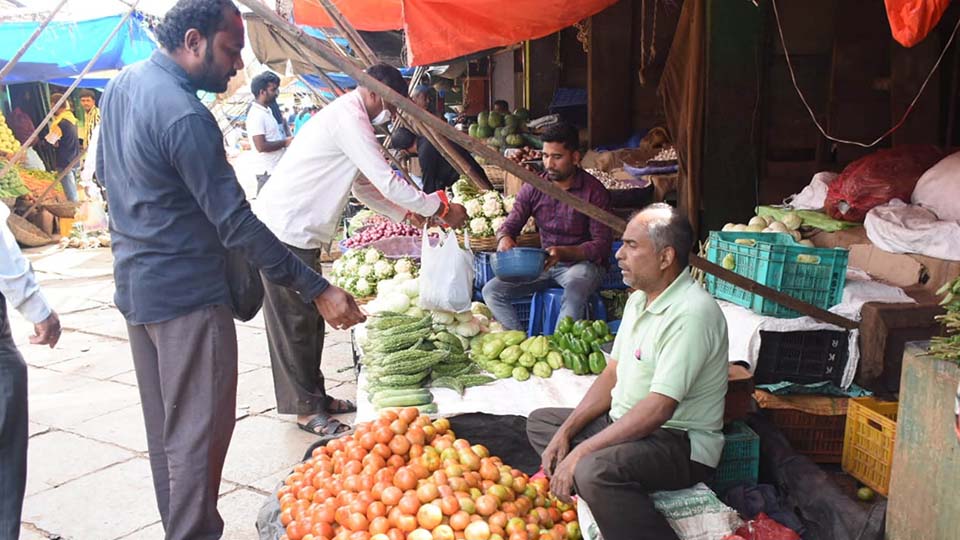Mysuru: Tomato prices have skyrocketed owing to heavy rains and prices hovered between Rs. 120 and Rs. 130 per kilo for the sour variety at all the markets in Mysuru. The jam variety of tomatoes costs between Rs. 130 and Rs. 140 per kilo. The second or grade three vegetable itself is priced at Rs. 80 per kilo.
Along with tomatoes, prices of other vegetables like drumstick, onion, green chilli and beans too have gone up, punching deep holes in household budgets and also distressing hoteliers who have to provide for customers, without increasing the menu prices. A slight increase in the prices would drive customers away, they said.
The rocketing prices started with the tomato but now the drumstick, too, is unsparing on the pocket. It cost Rs. 400 a kilo and the curry cucumber is selling at Rs. 80 per kilo. Before September, it seemed to be a much humbler vegetable at Rs. 15-20 a kilo. The ivy gourd or in local parlance ‘thondekai’ is being sold at Rs. 110 a kilo.
Drumstick and ivy gourd are the common ingredients in a vegetable sambar and looking at the way the prices have skyrocketed, it looks like people have to give up eating vegetables for some time. Wedding season has started and there is an increased budget allocation for the dining room and kitchen expenses that normally would be minimal.
To make good with the sour tomatoes for sambar, tamarind is the best option but tamarind is being sold at Rs. 140 per kilo. Green chilli is being sold at Rs. 80 per kilo, ridge gourd Rs. 60 per kilo, capsicum Rs. 100 to Rs. 120 per kilo, onion Rs. 25 to Rs. 45 per kilo, garlic is being sold at Rs. 60 per kilo, beans is costing Rs. 80 to Rs. 90 per kilo and carrot is costing Rs. 60 to Rs. 70 per kilo.
Double beans at Rs. 90 a kilo, cowpea Rs. 100, cauliflower and cabbage Rs. 70 to Rs. 80 and the humble pumpkin is at Rs. 25 to Rs. 40 a kilo. Unseasonal and heavy rain across Karnataka has damaged vegetable production, causing a shortage in supply.
Unseasonal rain, inflation
Traders squarely blame the rains for the inflation. They claim that the price will reduce slowly with the availability of fresh crops in January. The price rise has impacted not only households but also hotels. Some have removed tomato rice and tomato chutney from their menu. Households now use tamarind instead of tomatoes. A housewife said they now buy vegetables in grams.
Compared to vegetable prices, fruit prices have shown a decline. A kilo of apple costs Rs. 140, orange Rs. 180 a kilo, pomegranate Rs. 180, sapota Rs. 60 to Rs. 80, mosambi Rs. 80, grapes at Rs. 160 per kilo, and watermelon is being sold at Rs. 20 to Rs. 30 per kilo.
The Consumer Affairs Ministry last month said that prices will soften in December but unseasonal rains in several southern States as well as in Punjab, Uttar Pradesh, Haryana and Himachal Pradesh earlier in September has led to crop damage and delay in arrival.
Volatile tomato prices
The Ministry also warned that tomato prices are highly volatile. “Any slight disruption in supply chain or damage due to heavy rains result in spurt in prices,” the Ministry said. However, a report from Crisil Research says that the tomato prices will remain elevated for two more months with prices to fall after harvest from Madhya Pradesh and Rajasthan starts reaching the markets come January.
The report says that prices rose as much as 142 percent in the last week of November and will continue to remain so for the upcoming two months. The report that lack of rains in August delayed transplanting in the key regions where the vegetable is grown which in turn delayed arrivals leading to a price increase earlier in October.
Hole in the pocket
| Vegetable | Price per kilo |
| Tomato | Rs. 120 and Rs. 130 |
| Jam variety tomato | Rs. 130 and Rs. 140 |
| Grade II, III tomato | Rs. 80 |
| Drumstick | Rs. 400 |
| Curry cucumber | Rs. 80 |
| Ivy gourd (thondekai) | Rs. 110 |
| Tamarind | Rs. 140 |
| Green chilli | Rs. 80 |
| Ridge gourd | Rs. 60 |
| Capsicum | Rs. 100 to Rs. 120 |
| Onion | Rs. 25 to Rs. 45 |
| Garlic | Rs. 60 |
| Beans | Rs. 80 to Rs. 90 |
| Carrot | Rs. 60 to Rs. 70 |
| Double beans | Rs. 90 |
| Cowpea | Rs. 100 |
| Cauliflower | Rs. 70 to Rs. 80 |
| Cabbage | Rs. 70 to Rs. 80 |
| Pumpkin | Rs. 25 to Rs. 40 |








Farmers are also not getting any better price. But at least middlemen can celebrate their victory that their lifestyle is not disturbed.